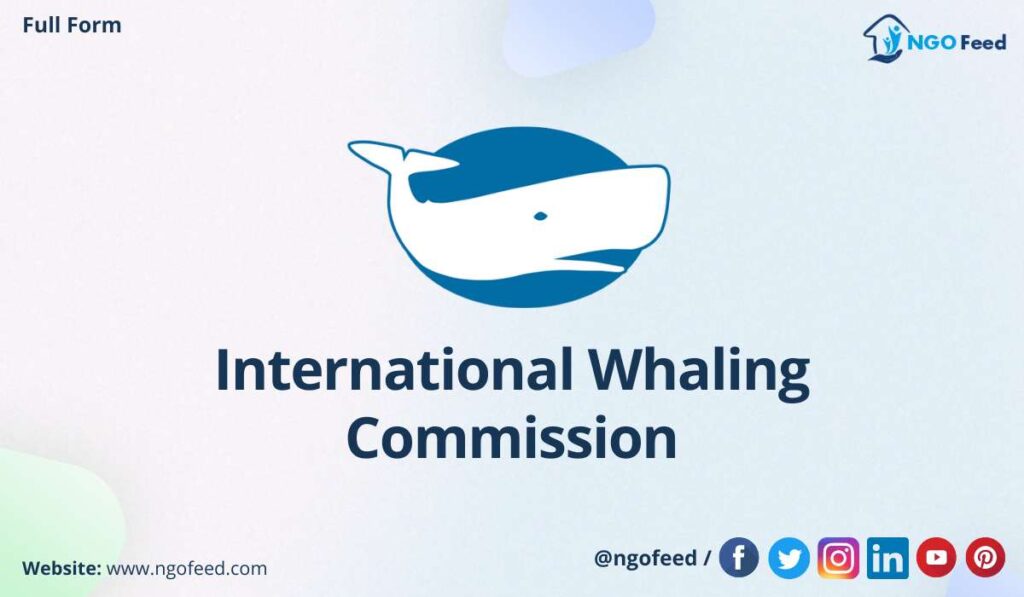The IWC Full Form is the International Whaling Commission which is a global organisation that was created to “provide for the proper conservation of whale stocks and thereby make possible the orderly development of the whaling industry.”
The IWC, which is the convention’s decision-making body, examines and updates the rules outlined in the “Schedule to the Convention,” which set global whaling regulations. These measures include granting full protection to specific species, designating certain areas as whale sanctuaries, imposing restrictions on the quantity and size of whales that may be taken, establishing open and closed seasons and areas for whaling, and outlawing the capture of female whales carrying calves and suckling calves.
History
The International Convention for the Regulation of Whaling, which was signed in Washington, DC, on December 2, 1946, provided the framework for the establishment of the IWC. The Convention’s preamble declares that its goal is to ensure the proper conservation of whale stocks and, as a result, enable the industry’s orderly growth.
The legally binding “Schedule” of the Convention is an essential component. The Schedule outlines the particular actions that the IWC has determined are required to control whaling and protect whale stocks.
These measures include limiting the amount of fish that can be caught by species and area (which may be zero, as is the case for commercial whaling), designating certain areas as whale sanctuaries, protecting calves and females who are carrying them, and restricting the types of hunting that are allowed. The Schedule can be changed and revised when the Commission meets, unlike the Convention (a change requires at least three-quarters majority agreement). The Schedule may need to be changed for a variety of reasons. These include updates from the Scientific Committee and changes to the requirements for indigenous people.
IWC Overview
| IWC | International Whaling Commission |
| Headquarters | Impington, Washington |
| Formation | 2 December 1946 |
| Managing Director | Rebecca Lent |
| Method | Social science research |
| Website | www.iwc.int/home |
| Official languages | English |
IWC Functions
- The International Whaling Commission (IWC) was established by the voluntary consent of the member countries to serve as the only governing body with the capacity to take action under the International Convention for the Regulation of Whaling.
- They provide for the proper conservation of whale stocks, enabling the industry’s orderly development and achieving its economic and environmental objectives.
- The commission’s responsibility is to evaluate and update the Convention’s Schedule on a regular basis.
- They function to establish the protection of specific species, whaling is controlled.
- Imposing restrictions on the quantity and size of captures; Defining open and closed seasons, locations, tactics, intensity, gear types, measurement techniques, and maximum catch returns for whaling.
Structure of IWC
- The International Whaling Commission (IWC) was established under the International Convention for the Regulation of Whaling in 1946.
- Headquarters located in Impington, near Cambridge, England.
- Three main committees: Scientific, Conservation, and Finance and Administration.
- Additional Technical Committee established but not currently active.
- Membership doubled since 2001, with 88 members as of February 2024.
- Members include states involved in whaling and non-whaling states.
- Meetings held biennially since 2012, with the Scientific Committee meeting annually.
- Each member state sends one voting representative (Commissioner) to meetings.
- Meetings are often divisive, with a split between pro-whaling and anti-whaling nations.
- Rules of Procedure allow for participation by non-parties, intergovernmental organizations, and NGOs with multiple offices.
Conclusion
The International Whaling Commission (IWC) governs and protects whale populations around the world. Established by the International Convention for the Regulation of Whaling, it makes sure that the whaling business grows in a controlled way while putting conservation efforts first. The IWC is still working hard to get its goal of sustainable whale management and protection accomplished, even though there are problems and disagreements.
Frequently Asked Questions (FAQs)
What is the IWC Full Form?
The ICW Full Form is International Whaling Commission.
When is IWC founded?
The IWC was founded on 2 December 1946
What is the purpose of IWC?
The purpose is to provide for the proper conservation of whale stocks and thus make possible the orderly development of the whaling industry.

